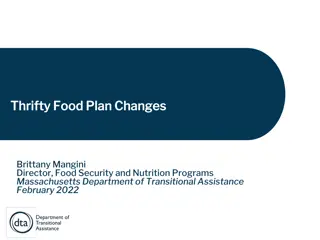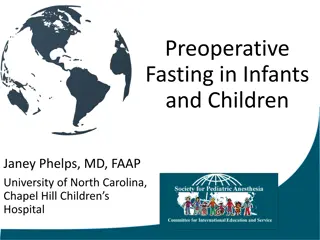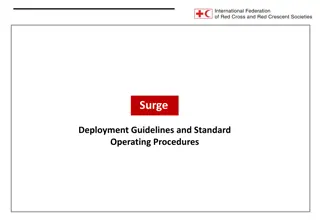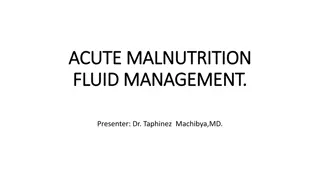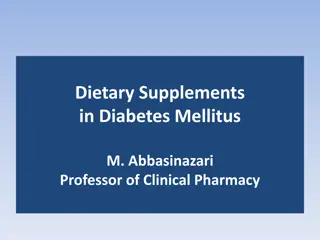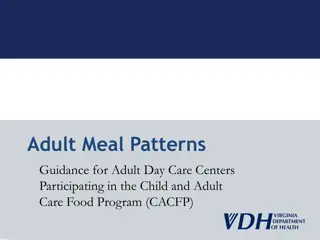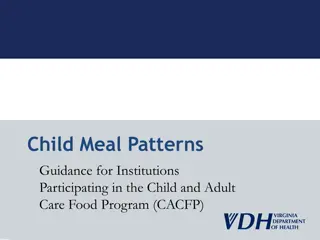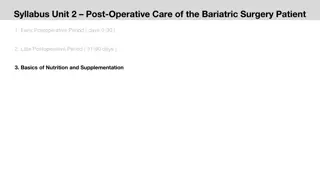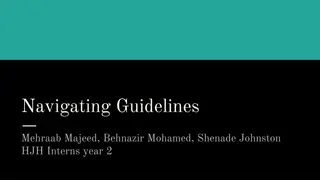Soluble Dietary Fibers Market Worth $4.99 billion by 2029
Nation-wide lockdowns in some regions have impacted the transportation of raw materials from suppliers. The temporary closures of manufacturing bases due to indefinite lockdowns and temporary quarantines impacted the growth of the soluble dietary fibers market during the pandemic.
0 views • 3 slides
Halal_Chicken_from_Brazil-_Ensuring_Quality_and_Authenticity[1]
In today's globalized marketplace, accessing high-quality halal chicken can sometimes pose a challenge. However, with Brazil emerging as a prominent supplier of halal poultry, consumers now have a reliable source for their dietary needs. Brazil is not only one of the world's largest exporters of chi
1 views • 2 slides
Soluble Dietary Fibers Market Projected to Reach $4.99 Billion by 2029
According to this latest publication from Meticulous Research\u00ae, the global soluble dietary fibers market is expected to grow at a CAGR of 7.8% from 2022 to 2029 to reach $4.99 billion by 2029\n
1 views • 4 slides
Nutrition and Kidney Health
Nutrition plays a pivotal role in kidney health, and making informed dietary choices can help prevent and manage kidney disease. Dr. Sunny Singhal, a trusted kidney disease doctor in Jaipur, provides expert guidance to help patients achieve better kidney function through proper nutrition. By followi
0 views • 6 slides
DPI Auditor Insights and State Audit Guidelines Overview
This collection of images and descriptions provides insights into DPI Auditor activities, state audit guidelines, and updates related to state major program determinations. The State Single Audit Guidelines for Wisconsin School Districts are highlighted, along with the State Audit Manual overview an
3 views • 36 slides
Updated Thrifty Food Plan Improves SNAP Benefits for Massachusetts Residents
The Department of Transitional Assistance in Massachusetts has implemented changes to the Thrifty Food Plan (TFP) to enhance SNAP benefits for low-income households. The updated TFP reflects the latest Dietary Guidelines for Americans and aims to address barriers to food access faced by SNAP users.
0 views • 7 slides
Preoperative Fasting in Infants and Children: Guidelines and History
Explore the evolution and rationale behind preoperative fasting guidelines in infants and children, including historical cases of aspiration during anesthesia. Learn about Mendelson Syndrome, recommendations for aspiration prevention, and the development of NPO orders over the years. Discover the im
0 views • 26 slides
Managing Nutritional and Metabolic Diseases in Zoo and Wild Animals
The prevention, control, and treatment of nutritional and metabolic diseases in zoo and wild animals are essential for maintaining their health. These diseases, such as rickets, osteoporosis, osteomalacia, and fibrous osteodystrophy, can result from imbalances in dietary nutrients and metabolic dera
0 views • 10 slides
Surge Deployment Guidelines and Standard Operating Procedures
Surge Deployment Guidelines and Standard Operating Procedures outline the principles and processes for deploying specialized personnel to support humanitarian operations in various emergencies. The guidelines aim to ensure equal opportunity, transparent processes, and quality responses among Red Cro
0 views • 12 slides
Maternal Nutrition Guidelines for Optimal Health Before and During Pregnancy
Recommended maternal nutrition practices play a crucial role in preventing nutrition deficiencies in both mothers and infants, improving fetal outcomes, and reducing morbidity and mortality rates. Preconception care emphasizes the provision of health interventions to women and couples before concept
0 views • 14 slides
Mainstreaming HIV and AIDS in Uganda: Guidelines and Initiatives
The presentation by Quinto Rwotoyera from Uganda AIDS Commission discusses the national guidelines for mainstreaming HIV and AIDS in all sectors in Uganda. The content covers the existing policy and guidelines, overview of the presidential FastTrack initiative, objectives of the guidelines, users of
0 views • 28 slides
Catering Menu: Start Your Day with Chartwells School Dining 2018-2019
Explore the diverse catering menu offered by Chartwells School Dining for the 2018-2019 academic year. From a variety of beverages to delicious breakfast options like bagel bars and fruit parfaits, this menu caters to various dietary preferences and needs. Enhance your dining experience with hot and
0 views • 19 slides
Dietary Recommendations for Weight Loss in Type 2 Diabetes
Dietary recommendations for overweight and obese individuals with type 2 diabetes aim to facilitate weight loss through calorie calculation, daily weighing, and structured eating patterns. Emphasis is placed on consuming at least 1200 kcal per day, avoiding meal skipping, and monitoring food intake
0 views • 18 slides
Concepts of Healthful Eating and Fitness Goals
Explore the concepts of balance, variety, and moderation in healthful eating using the Food Guide Pyramid and National Dietary Guidelines. Learn how to create a nutritious meal and set fitness goals for maintaining a healthy lifestyle. Discover the benefits of making healthful food choices to improv
0 views • 18 slides
Acute Malnutrition - Fluid Management and Treatment Overview
Acute malnutrition, particularly severe acute malnutrition (SAM), requires careful fluid management and a structured treatment approach involving stabilization, transition, and rehabilitation phases. This condition results from inadequate dietary intake or acute infections, leading to severe wasting
0 views • 23 slides
Understanding Low-Calorie, Diabetic, and Dietetic Ice Cream
Ice cream is a beloved frozen treat that can be modified to cater to various dietary needs, such as low-calorie, reduced-fat, diabetic-friendly, and dietetic options. From traditional ice cream to probiotic-enhanced variations, this article delves into product standards, fat content guidelines, arti
0 views • 14 slides
Understanding Dietary Supplements in Diabetes Mellitus
Explore the role of dietary supplements in managing diabetes mellitus, covering principles, complementary medicine, functional foods, history, regulations, and the definition of dietary supplements. Learn about the benefits and considerations of using supplements as a part of diabetes management.
0 views • 63 slides
NCAA Drug Testing Program and Nutritional Supplement Education
The NCAA emphasizes a food-first approach and cautions against the use of nutritional or dietary supplements due to the risk of contamination with banned substances. Student-athletes are advised to consult designated individuals before using any supplements as they may not be well-regulated. The NCA
0 views • 7 slides
Adult Day Care Meal Patterns Guidance for CACFP Participation
Providing well-balanced meals is crucial for adult day care centers participating in the CACFP. The meal pattern requirements ensure menus meet nutritional needs, align with Dietary Guidelines for Americans, and offer appetizing variety. Components for breakfast, lunch, supper, and snacks must be in
0 views • 26 slides
Child Meal Patterns Guidance for CACFP Participants
Child Meal Patterns Guidance for Institutions in CACFP aims to ensure well-balanced meals for children, meeting nutritional needs and aligning with Dietary Guidelines. The program specifies components required for breakfast, lunch/supper, and snacks to qualify for reimbursement. Menu planners must c
0 views • 26 slides
Understanding Special Diets and Managing Obesity
Explore the impact of nutrients on our bodies, causes of special diets, health issues linked to certain diets like obesity and vegetarianism, and dietary guidelines to manage conditions like CHD and Coeliac disease. Delve into the challenges of childhood obesity in Ireland, reasons for overeating, h
0 views • 37 slides
USDA Non-Dairy Milk Substitutes September 2015
Explore the USDA regulations and guidelines for non-dairy milk substitutes, focusing on cow's milk and soy milk. Learn about food allergies versus intolerances and the importance of approved substitutions. Understand the serving regulations for milk in CACFP meals and the accommodations required for
1 views • 11 slides
Understanding Minimum Dietary Diversity for Women and Children
Explore the concept of Minimum Dietary Diversity for women and children aged 6-23 months, focusing on food group scores, indicator calculations, and the importance of consuming foods from various groups to meet nutrient needs. Learn about the key food groups, data collection methods, and the signifi
0 views • 12 slides
Comprehensive Guide to Bariatric Patient Nutrition
This comprehensive guide outlines the dietary requirements and progression for bariatric patients, from pre-operative liver reducing diets to post-operative meal plans. Key dietary elements, including regular balanced meals and portion control, are highlighted. The guide also covers the importance o
1 views • 13 slides
Understanding Diarrhea: Causes, Symptoms, and Pathophysiology
Diarrhea is a common symptom that can be caused by various factors such as viral, bacterial, parasitic infections, dietary changes, drugs, systemic diseases, and intestinal obstructions. It can lead to dehydration and other serious complications if not treated promptly. The pathophysiology of diarrh
0 views • 15 slides
Dietary Restrictions in Neutropenic Oncology Patients
The project explores the impact of restricting fresh fruits and vegetables intake on cancer patients undergoing myelosuppressive chemotherapy. Despite common practice, evidence supporting dietary restrictions is lacking. The study aims to determine if such restrictions truly prevent infections and i
0 views • 32 slides
Understanding the Cultural Dimensions of Food and Religious Influences in Culinary Arts
Explore the impact of religious beliefs on food traditions and dietary restrictions across different cultures in the culinary world. Learn about the influence of major world religions on eating habits, food choices, and culinary practices. Discover how various religious groups, such as Christians, o
0 views • 26 slides
Simon Marks Jewish Primary School - Ethos and Kashrut Guidelines
Simon Marks Jewish Primary School is a modern Orthodox school emphasizing Jewish values and traditions. The school maintains a kosher environment and outlines guidelines for buying and consuming kosher food. Understanding and respecting the school's ethos and dietary requirements are key aspects of
0 views • 14 slides
Meeting Daily Dietary Fibre Needs with Oatmeal, Corn Kernels, and Lettuce
Learn how much oatmeal, corn kernels, and lettuce you should eat to meet your daily dietary fibre requirements, with detailed serving sizes and fibre content provided. The reference values emphasize the importance of consuming at least 25g of dietary fibre per day for optimal health.
0 views • 28 slides
Improving Nutrition Goals for Children with CF
Optimizing growth and weight gain is crucial for children with cystic fibrosis (CF) to enhance health outcomes and survival. Behavioral barriers often hinder patients from achieving nutrition goals, but interventions combining nutrition and behavioral strategies have shown effectiveness. This approa
0 views • 27 slides
Home-Delivered Meal Eligibility Policies and Procedures
Guidelines and regulations for determining client eligibility and service priority for home-delivered meals for older Native Americans and family caregivers. The policies cover assessment criteria, limitations, settings for service provision, and considerations for non-Native American individuals. E
0 views • 9 slides
Long-Term Dietary Management for Bariatric Surgery Patients
In the post-operative care of bariatric surgery patients, long-term dietary management plays a crucial role in ensuring successful weight loss maintenance. Factors such as motivation, willingness, and adherence to a healthy diet influence eating habits. Patients are advised on dietary progression, s
0 views • 10 slides
Nigeria Agriculture Policy Activity (NAPA) - Sustainable Dietary Change Through Agri-Food System Transformation
Nigeria faces a significant challenge with malnutrition, requiring sustainable dietary changes through agricultural value chain growth. The country's agri-food system needs urgent transformation to support healthier diets and environmental sustainability. Research aims to analyze how agricultural gr
0 views • 10 slides
Dental Dietary Counseling: Enhancing Oral Health Through Nutrition
Providing dietary counseling plays a crucial role in promoting oral health by educating patients on the impact of food choices on dental well-being. This involves identifying high-risk individuals, evaluating their diet, and creating personalized action plans to improve their dietary habits. Through
0 views • 47 slides
Association of Fruit, Vegetable, and Legume Intake with Cardiovascular Disease and Mortality
The study conducted by the PURE investigators examined the relationship between fruit, vegetable, and legume consumption and cardiovascular disease (CVD) and mortality in a cohort of 135,335 individuals from 18 countries. Dietary guidelines recommend at least 5 daily servings of these foods, which h
0 views • 27 slides
Understanding Dietary Control Practices in Patients with Type 2 Diabetes Mellitus
This qualitative study explores dietary control practices among patients with type 2 diabetes mellitus. Conducted in Bantul, Yogyakarta, the research reveals challenges faced by individuals in managing their diet, particularly in avoiding fried foods and sugary drinks. Factors influencing blood gluc
0 views • 7 slides
Adventist Health Studies Contributions & Collaborations Overview
Adventist Health Studies have made significant contributions to understanding the health and longevity advantages of Seventh-day Adventists, particularly focusing on vegetarian diets and cardiovascular health. With a history spanning over 57 years and various cohort studies, these studies have provi
0 views • 12 slides
USDA New Meal Pattern Guidelines Implementation Overview
The USDA has introduced new meal pattern guidelines effective from October 1, 2017, impacting various food components like Vegetables and Fruits, Grains, Meat and Meat Alternatives, Fluid Milk, Food Preparation, and Additional Provisions. The guidelines aim to promote healthier eating habits by rest
0 views • 10 slides
Understanding Medical Guidelines and Their Impact on Healthcare Practices
Medical guidelines play a crucial role in guiding decisions related to diagnosis, management, and treatment in healthcare. They are generated through a structured process involving data collection, evidence prioritization, and consensus among experts. These guidelines, whether at national, regional,
0 views • 16 slides
Exploring Dietary Choices in America
Americans have diverse dietary preferences, from organic and vegetarian to vegan and gluten-free options. This guide explains the principles behind these choices and provides tips for understanding and navigating the American diet landscape. Explore the impact of food choices on health, the environm
0 views • 13 slides

![Halal_Chicken_from_Brazil-_Ensuring_Quality_and_Authenticity[1]](/thumb/86918/halal-chicken-from-brazil-ensuring-quality-and-authenticity-1.jpg)



